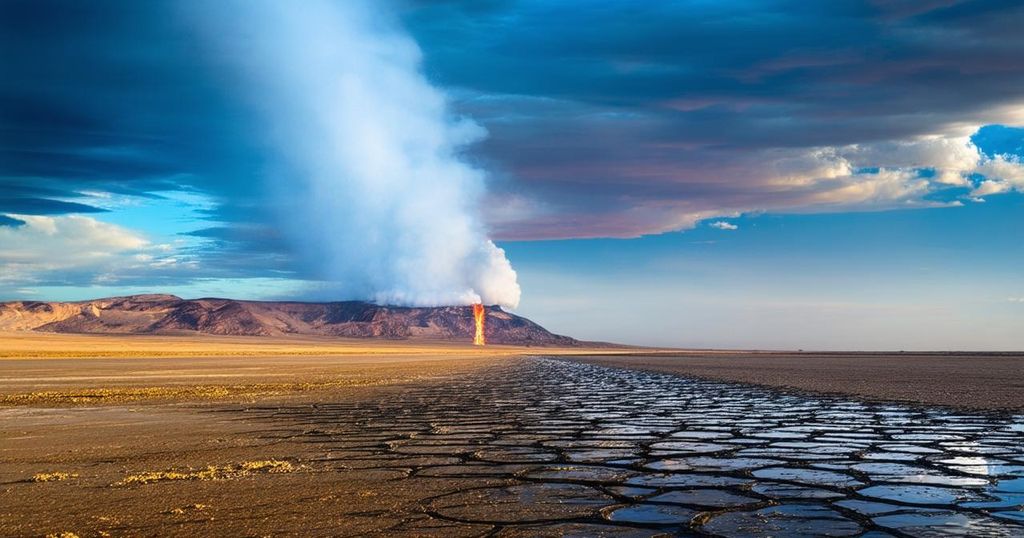The UN has warned that the world is on track for a perilous 3.1C increase in global temperatures, necessitating urgent international efforts to cut emissions. The UN Environment Programme’s latest report claims that the goal of limiting warming to 1.5C will soon be unrealizable without unprecedented action. Current pathways suggest temperature rises between 2.6C and 3.1C, particularly in light of remaining greenhouse gas emissions and insufficient yielded actions from governments. The report calls for substantial collective commitment from countries ahead of the upcoming Cop29 talks.
The United Nations has indicated that the world is likely heading towards a hazardous 3.1C increase in global temperatures this century, as outlined in its latest assessment. This alarming prediction urges countries to undertake extensive measures to reduce carbon emissions driven by climate change. The UN Environment Programme (UNEP), in its annual report discussing the discrepancy between necessary emission reductions to cap global warming at 1.5C and current and pledged actions, asserted that without unprecedented global cooperation, the 1.5C objective will soon become unachievable. Presently, the world is on course for a rise between 2.6C and 3.1C, which hinges on the effectiveness of pledged climate actions. This warning precedes the upcoming UN Cop29 conference in Baku, Azerbaijan, where nations are being called upon to adopt more ambitious strategies to support developing countries in their climate initiatives and address the emissions gap. The UNEP report highlights that greenhouse gas emissions reached an unprecedented level last year. Notably, the report states that existing, cost-effective technologies are available to achieve the requisite reductions necessary to limit the temperature increase to 1.5°C and avert the direst impacts of climate change. Countries previously committed, at the 2015 Paris climate talks, to limit warming to well below 2C and to strive for an increase of no more than 1.5C above pre-industrial levels. Scientists warn that irrespective of the amount of climate change, 1.5C has become a critical threshold beyond which severe impacts from climate change, such as extreme heatwaves, prolonged droughts, catastrophic floods, ecosystem collapse, and rising sea levels, become inevitable. Nations are expected to devise country-specific action strategies, termed nationally determined contributions (NDCs), aimed at meeting Paris targets by curtailing emissions from fossil fuel combustion and enhancing carbon capture through forest conservation. Yet, as states prepare to roll out new action plans targeting 2035, the UNEP conveys urgent concerns that the aspirations for curbing dangerous warming are becoming increasingly elusive. Global greenhouse gas emissions have risen dramatically by 1.3% in 2023 compared to the previous year, with the G20 nations responsible for a staggering 77% of global emissions. The analysis posits that under current policies, a global temperature rise of 3.1C is imminent, while even full implementation of climate plans through 2030 would only lead to a 2.6C-2.8C rise, which nations are currently failing to meet. UN Secretary-General Antonio Guterres remarked that humanity stands at a pivotal moment: “Either leaders bridge the emissions gap, or we plunge headlong into climate disaster – with the poorest and most vulnerable suffering the most.” He emphasized that the repercussions are manifesting in the form of devastating hurricanes, historic floods, and extreme heat. He urged governments to eliminate greenhouse gas emissions, diminish dependence on fossil fuels, accelerate the expansion of renewable energy, and find solutions to deforestation, while simultaneously establishing a financial goal at Cop29 to facilitate developing countries’ climate responses. Inger Andersen, the UNEP Executive Director, declared, “Climate crunch time is here. We need global mobilisation on a scale and pace never seen before – starting right now, before the next round of climate pledges – or the 1.5C goal will soon be dead and well below 2C will take its place in the intensive care unit.” She implored nations partaking in Cop29 to take immediate action while preparing robust national frameworks to achieve the critical 1.5C objective, stating that even if a 1.5C overshoot occurs, the pursuit of net-zero and sustainable development is imperative. Nations must commit to slashing 42% of yearly greenhouse gas emissions by 2030 and 57% by 2035 in the forthcoming NDCs to realize the 1.5C goal. This is technically attainable through strategies that involve tripling renewable energy capacity by 2030, enhancing energy efficiency, reducing fossil fuel dependency, and restoring natural ecosystems. However, UNEP stresses that achieving substantial global emission reductions demands an immediate, collective effort initiated by the G20 countries. Furthermore, Ed Miliband, the UK Energy Secretary, reaffirmed the urgency conveyed in the report, asserting, “This report is yet another clarion call about the need for global leadership to protect our way of life and home for future generations.” He reiterated that the decreasing costs associated with renewable energy offer viable solutions to confront the climate crisis without compromising current economic conditions or future prospects.
The ongoing concerns surrounding global warming stem from the increasing concentration of greenhouse gases in the atmosphere, primarily due to human activities such as burning fossil fuels and deforestation. Climate change poses significant risks to natural ecosystems, human health, and economies worldwide. The 2015 Paris Agreement established global climate goals, aiming to limit global temperature increases and reduce emissions substantially. The periodic assessments from the UN Framework Convention on Climate Change (UNFCCC) and UNEP report on countries’ progress towards these targets, emphasizing the timely need for coordinated international efforts to mitigate climate change impacts.
In summary, the UN’s recent warnings underscore the urgent need for comprehensive and immediate action to combat climate change effectively. The 3.1C warming trajectory is unsustainable and poses severe risks to global ecosystems and communities, particularly the vulnerable. Countries are called upon to enhance their climate pledges and implement robust strategies for greenhouse gas reductions. Without decisive leadership and cooperative global action, achieving the crucial 1.5C goal will remain increasingly unattainable, with dire consequences for the planet and future generations.
Original Source: www.irishnews.com






